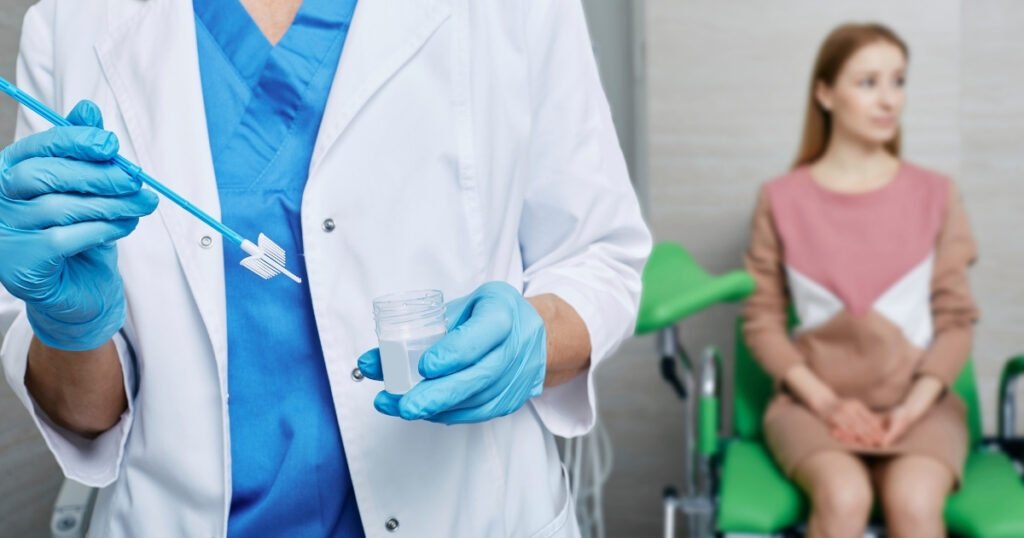Pap Smear
As a gynecologist, in India I frequently talk to my patients about Pap smears. Despite its intimidating reputation this test is crucial for maintaining your well-being. Let’s take a look at why it’s important to endure a bit of discomfort.
What Happens During a Pap Smear?
A Pap smear is a procedure done at the doctor’s office to check the health of your cervix. The cervix, like the neck of a bottle is the part of your uterus that connects to the vagina. During the exam your doctor will gently collect a cell sample from your cervix for analysis at a lab.
Why is Getting a Pap Smear Important?
The main goal of a Pap smear is to detect signs of cancer. This type of cancer starts, in the cells of the cervix. Is often associated with papillomavirus (HPV) an infection commonly spread through sexual activity. By detecting any cell changes through Pap tests it’s possible to catch them before they turn into cancerous growths. Early diagnosis greatly improves the chances of treatment if cervical cancer is found.
Who Needs to Have Pap Smears and How Often?
In India it is recommended that most women should start to have Pap smears at the age of 21. The frequency of these screenings will vary depending on your age and test results.
- For women, between the ages of 21 and 29: It is suggested to have a Pap smear every three years.
- For women aged 30 to 65: You are advised to undergo a Pap smear every three years every five years when combined with an HPV test as recommended by your healthcare provider.
Once you reach the age of 65 and if your previous tests have shown results, you may not need Pap smears anymore. It’s important to discuss with your doctor to determine what’s most suitable for you.
What Occurs During a Pap Smear?
While it may be slightly uncomfortable getting a Pap smear is typically quick and not excessively painful. Here is what usually takes place.
- Preparation: You will lie down on an examination table with stirrups, for your feet. Might be requested to change into a gown.
- Cell Collection: Your doctor will use a speculum, a device that gently opens the vagina for visibility of the cervix. They will then gather cells using a brush or spatula. You may feel some pressure or slight discomfort, at this stage.
- Finished! Your sample has been sent to the lab. You’re all set to continue with your day.
A Personal Anecdote
I’ll never forget a patient who came to see me feeling anxious and embarrassed because she had delayed getting her Pap smear for years. During the examination we found signs of cancer. Luckily, we caught it in time. A simple procedure resolved the issue. She was immensely relieved to have caught it. That experience emphasized the importance of these tests!
Results and Next Steps
Typically, your Pap smear results will be ready, in a couple of weeks. Most of the time everything will be normal. However occasionally we may notice some cell changes;
- Minor Changes: No need to fret! It often just indicates that you’ll need another test sooner than expected.
- Changes: This doesn’t necessarily indicate cancer. Your doctor will talk about any tests or treatments that may be necessary.
Commonly Asked Questions about Pap Smears:
1. Can I have a Pap smear while on my period?
It’s best to avoid scheduling your test during your cycle as it could affect the accuracy of the results.
2. Does a Pap smear test, for transmitted infections (STIs)?
No Pap smears are specifically done to screen for cancer. Separate tests are needed for STI screening.
3. Is a Pap smear?
Most women usually experience discomfort, like a pinch or pressure. If you’re feeling anxious it’s important to let your doctor know so they can help you feel more comfortable.
4. What if I feel embarrassed?
Please don’t worry! Gynecologists are used to seeing bodies of all shapes, sizes, and ages. Their focus is on your well-being.
Pap Smear: Your Health Ally
Remember, Pap smears are designed to support your health! They play a role, in safeguarding your well-being. Taking a few minutes out of your day can offer peace of mind and the chance to detect any issues early on. So don’t hesitate—talk to your doctor about scheduling your Pap smear today!
Book an appointment:
Mobile: 8095 37 0000
Telephone: 080 2503 4444, 080 2503 4455
Email: info@svasthahospital.com
Remember, you’re not alone on this journey. At Svastha, we’re all about helping you. Let’s walk this path together, one step at a time.

